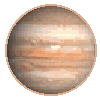Astronomy : Planets - Facts II 
Some basic facts of the nine planets in our solar system are given below. Mercury, at a orbiting speed of about 107,030 mph (172,240 kmph), takes about 87.97 days to complete one revolution around the Sun and is the swiftest planet of our solar system. Venus, also known as the Evening Star or Morning Star, is the brightest planet as seen from the surface of the Earth. It has an apparent brightness magnitude of −4.4. It is the brightest object in the night sky after the moon (which is Earth's only natural satellite and not a planet). Earth, with a density of nearly 5.52 times that of water, is the most dense planet of our solar system. It is the only planet known to support abundant life. Mars is called the 'Red Planet' because of its red soil (rich in iron oxide) and pink sky. The planet is named after the Roman God of War. Its red color was associated by ancient civilizations with the blood of battles. Jupiter, with an equatorial diameter of about 88,850 miles (142984 km) is the largest of the nine planets that revolve around the Sun. Its mass is approximately 318 times, and volume 1300 times that of the Earth. In other words, Jupiter could contain about 1300 Earth-sized balls. The Great Red Spot of Jupiter, which is equal to two Earth-sized circles, is the biggest hurricane in the solar system. Saturn, with a density about 0.69 times that of water, is the planet with the lowest density in our solar system. If the planets were placed in a huge ocean, then Saturn would be the only one to float on the water. Uranus has the most-tilted axis. Its axis is unusually tilted at 98o to the vertical. Unlike other planets that spin like tops as they revolve around the Sun, Uranus appears to be rolling along its orbit because it spins on its side. Neptune is thought to have storms as revealed through the Hubble space telescope in 1994 by the dark spots in its southern hemisphere. Pluto, the outermost planet, with an equatorial diameter of about 1420 miles (2285 km) is the smallest planet of our solar system. Contrary to popular opinion, Mercury is not the smallest planet. Try Quizzes on Astronomy : Planets - Facts II |
5 more pages in Astronomy Quiz Activities